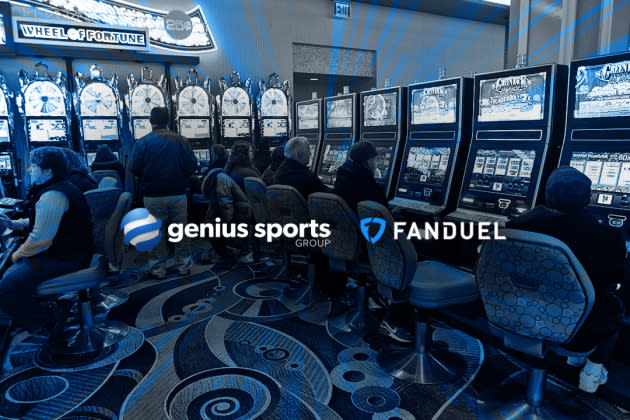FanDuel, Genius Sports Sign Two-Year Marketing Partnership

FanDuel is partnering with Genius Sports’ marketing division on a two-year partnership to run personalized, targeted ads in states where the company operates.
At the heart of the deal is customer acquisition. As more U.S. states legalize sports betting, FanDuel and its competitors are in a land grab for users. Many operators are willing to pay around $300 per customer acquired, and some as high as $700.
Genius Sports’ pitch is that it can use insights from its core data business to lower those costs by targeting specific people in a more direct way. That includes information from global betting patterns, fan affinity and media consumption, all of which influences how and when Genius buys media for its clients.
As an example, consider a typical NFL Sunday. If Genius Sports notices that there’s a lot of money being wagered on the Los Angeles Rams, it can push advertisements to news stories that are discussing the Rams, and specifically target people who have shown interest in the team previously.
“That ultimately allows us to drive better response rates,” said Josh Linforth, Genius Sports Group commercial director. “That backs out to a lower cost of acquiring a new player.”
Terms of the agreement weren’t disclosed. Linforth said the deal is structured like a traditional agency contract, where there is a pre-approved budget, as opposed to a model that fluctuates on customer acquisition.
FanDuel, owned by Dublin-based Flutter Entertainment, is the most popular U.S. sportsbook by market share. In the first half of 2020, a six-month stretch defined by COVID-19 disruption, Flutter’s U.S. business division spent $121 million (88 million pounds) on marketing, up from $73 million (53 million pounds) from the same stretch the previous year.
That spend will only increase. Each new U.S. state that allows mobile betting—Virginia was the latest—prompts a rush of companies hurrying to first launch, and then to start drawing new customers. The advertising blitz can be overwhelming.
Marketing is a lesser-known part of Genius Sports’ business. The company made the bulk of its money last year selling data to leagues, media companies and sportsbooks—those accounted for $102.7 million of its $114.6 million in revenue in 2019.
The other $11.9 million, however, came primarily from its marketing technology. It’s a fast-growing part of the company, particularly in the U.S., where Linforth said marketing revenue was 5-7% of the company’s marketing total in 2019, and is now closer to 40%.
The company, which is going public in a $1.5 billion SPAC deal, has more than 100 marketing customers, according to a recent filing. That includes sportsbooks and professional sports franchises, such as the Vancouver Canucks, Los Angeles Dodgers and Houston Astros.
How targeted can the ads get? Linforth offered another example of how they can profile households.
“If we know that someone has consumed NFL content on his phone, and we know this is the TV in that household,” he said, “then we can make sure to put a sportsbook ad in front of him on the largest screen in the house.”
More from Sportico.com

